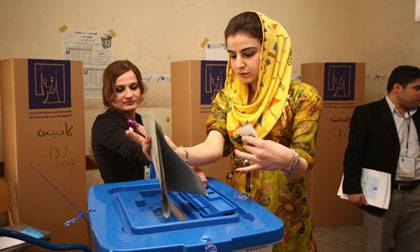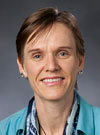
"To call this an 'election' is an abuse of the word; it's empty talk, and it is certainly not a sign of a serious reform agenda. If they are serious about reform, let them release all the political prisoners and allow independent observers into Syria for a start." -- Opposition leader Mahmoud Muraie, Dec. 12, 2011
"I can assure you that we will do our work honestly and with an open mind. We will register the positive aspects of the process, but we'll also not shy away from pointing out any shortcomings or irregularities we come across." -- Heidi Tagliavini, the head of the OSCE mission to monitor the March 4 presidential election in Russia, Jan. 26, 2012
In these news reports and hundreds more like them lie the seeds of Judith Kelley's research. Reading them, she wondered how foreign observers rose to such influential roles, when elections were traditionally such a bastion of national sovereignty. Why do some countries invite election monitoring organizations, when candidates clearly intend to cheat? Are foreign election monitors accurate and objective? Most important, do they improve the quality of elections?
Kelley spent six years pursuing answers to these questions, funded by a grant from the National Science Foundation. The effort culminated in the publication of her book, "Monitoring Democracy: When International Election Observation Works, and Why It Often Fails" (Princeton University Press, March 2012).
When she began her research in 2006, she found an area ripe for investigation. The number of major observer missions to elections in non-established democracies went from zero in 1975 to more than 85 in 2004. The number of monitoring groups also proliferated. In the 2008 Georgian election alone, 37 domestic, 43 international organizations and 16 embassies registered to observe. Despite this growth, no uniform standards of practice have evolved in the field. A UN statement of principles for monitoring has been endorsed by a number of organizations, but in practice, many of them fail to live up to the commitments it contains, Kelley said. In addition, observers' activities are diverse, and range from providing pre-election technical assistance and training to observing thousands of polling sites.

The proliferation of monitored elections around the world might suggest that democracy is on the rise. In fact, Kelley says, democratic gains made since the mid 1980s are in retreat. By 2010, the world's electoral democracies had dropped to 115 -- the fewest since 1995, according to Freedom House, an NGO that tracks human rights and political freedoms. Recent developments in Tunisia and Myanmar appear promising, Kelley said, "but it's too soon to tell." Although election monitoring has become a highly touted tool for democracy promotion, the connection between it and actual democratic governance is by no means clear.
As a Dane living in the United States, Kelley noted in the preface to her book that she can fulfill neither the Danish residency requirement nor the American citizenship requirement, and is therefore, "entirely disenfranchised."
"Perhaps this explains my fascination with elections," she said. "To me they represent that most fundamental exercise of a citizen: the right to express one's preference, to be counted, to be part of the conversation, to be considered worthy of persuading."
Kelley found the literature was dominated by case studies that arrived at different conclusions about the effectiveness of monitoring. There were no quantitative or systematic studies that considered whether the practice conformed to political theories, particularly those related to the interaction of international and domestic politics. And when Kelley requested election monitoring reports from the Organization for Security and Co-operation in Europe (OSCE) on elections in post-communist countries during the early 1990s, she was surprised to learn she was the first person to ask for them.
Kelley's research team, which involved many Sanford School of Public Policy students, collected data on 1,324 national elections from 1975 to 2004, of which about a third were monitored. They coded more than 40,000 pages of election monitoring documents, such as reports, press releases and interim statements, collected from more than 600 monitoring missions.
"I made some fairly decent enemies at some of these organizations," she says. Some, such as the OSCE, were very cooperative, while others resisted inquiries into their practices and motivations. Despite having rights as a European citizen to access reports from the European Union (EU), she exchanged nearly 200 e-mail messages and nearly had to file suit to obtain records she sought. At another organization, a staff member told her by phone, "The report you're asking for I am holding in my hand, but I am being told to tell you it does not exist."
In addition to analyzing all the data from the monitoring organizations, Kelley's research team coded reports from the U.S. State Department on human rights practices, which provided some 4,000 pages of comparable data on elections. Kelley created a scale to assess whether elections had minor, moderate or high levels of problems, and a corresponding assessment of the elections as acceptable, ambiguous or unacceptable, meaning the outcome failed to represent the will of the electorate. She also developed a method for rating the credibility of each organization in relation to other groups. The result of her efforts is the first systematic evaluation, across countries and across time, of the effectiveness of international election monitoring organizations.

One thing she didn't do was during her six-year study of election monitors was join an election observation mission.
"I turned down each and every observation invitation," Kelley said. "I felt I could not be objective. I also felt I couldn't learn that much on the ground beyond what I could learn from talking to people. I have been invited to some dangerous places, too -- Afghanistan, Pakistan -- and they were vetoed by my husband and my teenage daughter."
Kelley says her conclusions are like the classic Western film, "The Good, The Bad and The Ugly": "The good part is that monitors can improve election quality. The bad part is that most of the time they do not. The ugly part is that they are sometimes biased and contribute to the false legitimization of governments." Among her findings:
- In about half the countries that have hosted monitors there has been at least some improvement, but improvements are often short-lived. Even when monitored, politicians cheat 25 percent of the time.
- Monitoring works well in countries already on the road to transition, where there are domestic pressures for change, and where the international community is willing to use its leverage. Without these conditions, even repeated efforts in a country are likely to be futile.
- Elections monitored by the most credible organizations are better and result in greater incumbent turnover. Those monitored by low-quality monitors look similar to elections not monitored at all.
- Monitoring organizations have their own political entanglements, practical constraints and normative concerns that dilute their effectiveness and compromise their neutrality. Large, regional intergovernmental organizations (IGOs) have the greatest resources and leverage to conduct effective and professional monitoring, but also have more political baggage and less autonomy. As a result, smaller NGOs are more likely to criticize elections.
- A crowded field of monitoring organizations leads to competition for resources, attention, credit and influence. Although fewer might be better, Kelley believes the number will continue to grow.
One of the Kelley's goals is to encourage journalists and government officials -- who are trying to determine if foreign leaders are legitimately elected -- to take monitors' reports "with a grain of salt."
"What's presented as fact is often opinion, or an incomplete assessment made with limited resources. It is so confounding," Kelley said. "Some organizations tend to do a worse job than others, but even among the better ones, none are perfect."
Her work has led her to suggest a number of reforms, including:
- Include a conflict of interest statement with each election observation report.
- Set higher standards for government cooperation before accepting invitations to monitor elections.
- Place greater priority on issuing a final, public report in a timely fashion, and post these reports online. The time between elections and final reports is often lengthy, diminishing the effectiveness of the mission.
- Follow up. Monitors often make long lists of recommendations, but when asked to return to the same nation a few years later, they fail to review responses to their own recommendations.
- Build capacity before publicly assessing compliance with international election standards. In countries that struggle to assemble voter rolls, ensure the secrecy of the vote, or handle other administrative tasks, organizations can assist countries with developing basic capacity first.
- When the election environment is violent, keep a low profile. Public assessments by outside groups can fuel conflict.

Russians demonstrate "For Fair Elections" on Feb. 25, 2012 in St. Petersburg, Russia. Credit: Dmitry Nikolaev/Shutterstock.com
Kelley's research is beginning to have an impact. Last March, she was invited to Johannesburg, South Africa, to speak to the inaugural meeting of the Kofi Annan Global Commission on Elections. The group's membership includes Annan, U.N. Secretary-General from 1997to 2006, and Martti Ahtisaari, former president of Finland, both Nobel Laureates, as well as three other former presidents: Ernesto Zedillo (Mexico), Festus Mogae (Botswana), and Vaira Vike-Freiberga (Latvia). Kelley calls the meeting the pinnacle of her career so far.
"Presenting my research findings to two Nobel laureates, to people who really care about the issue and can influence changes in how election monitoring is done, was an amazing feeling."
On the other hand, her message hasn't been met with total enthusiasm among monitoring organizations.
"There is not much I have to say that they don't already know, but there is a lot they don't want to hear," Kelley said. But she is sympathetic.
"They are well-meaning individuals and this is their livelihood. They live from one funding opportunity to the next, and election to election, so it is difficult to reform their processes, but they are doing a lot to try to reform."